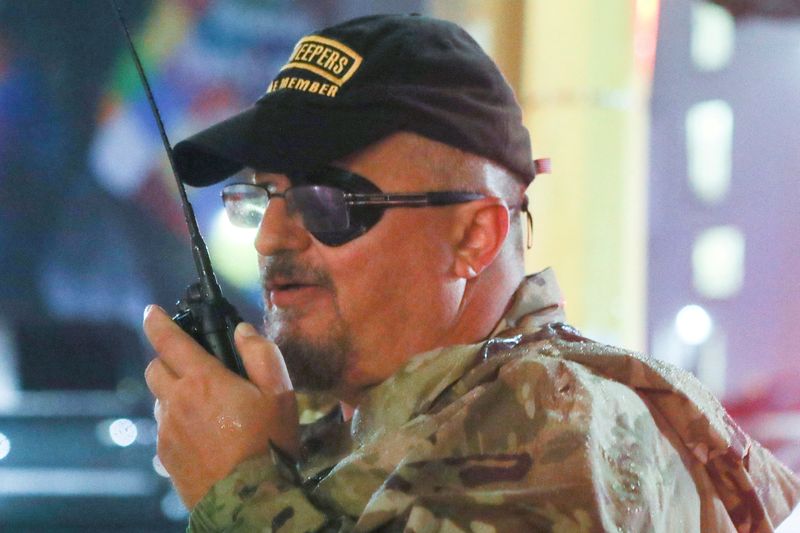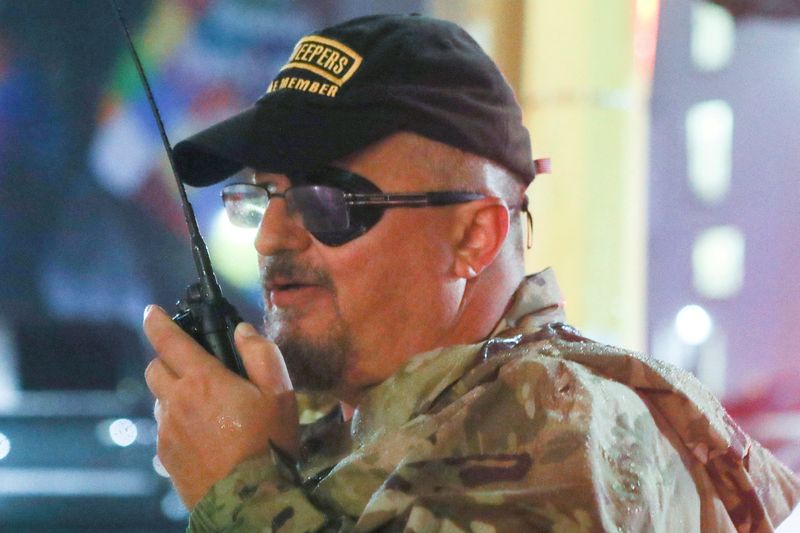By Sarah N. Lynch
WASHINGTON (Reuters) - The founder of the far-right militant Oath Keepers Stewart Rhodes was sentenced to 18 years in prison on Thursday for seditious conspiracy, the longest sentence imposed to date over the Jan. 6 U.S. Capitol riot that sought to keep Donald Trump in the White House.
U.S. District Judge Amit Mehta delivered the sentence after a defiant Rhodes stood before him in an orange jumpsuit and claimed he was a "political prisoner" who, like Trump, was trying to oppose people "who are destroying our country."
“For decades, Mr. Rhodes, it is clear you have wanted the democracy of this country to devolve into violence," Mehta told him.
"I dare say, Mr. Rhodes, and I've never said this about anyone who I've sentenced: You, sir, present an ongoing threat and peril to this country, to the republic and the very fabric of our democracy."
Rhodes, a former Army paratrooper turned Yale-educated lawyer, was convicted in November by a federal court jury in Washington.
Rhodes' prison term represents the longest sentence for any of the 1,000-plus people charged in connection with the Jan. 6, 2021, Capitol attack by supporters of Republican then-President Trump in a failed bid to block Congress from certifying Democratic rival Joe Biden's November 2020 election victory.
Until now, the longest sentence was 14 years in prison given to a Pennsylvania man who attacked police during the rampage.
Prosecutors had sought a sentence of 25 years for Rhodes.
"Mr. Rhodes led a conspiracy to use force and violence to intimidate and coerce members of our government into stopping the lawful transfer of power following a presidential election,” federal prosecutor Kathryn Rakoczy said. “As the court has just found - that is terrorism.”
Rhodes expressed no remorse and instead accused the far left of destroying America.
“I believe this country is incredibly divided. And this prosecution - not just of me, but of all J6ers – is making it even worse. I consider every J6er a political prisoner and all of them are being grossly overcharged," he said.
He also vowed “to expose the criminality of this regime” from his prison cell.
In addition to seditious conspiracy - a felony charge involving attempting "to overthrow, put down or to destroy by force the government of the United States" - Rhodes was convicted of obstructing an official proceeding and tampering with documents. Rhodes was acquitted of two other charges.
Rhodes, who wears an eye patch after accidentally shooting himself in the face with his own gun, founded the Oath Keepers in 2009.
The militant group's members include current and retired U.S. military personnel, law enforcement officers and first responders. They have appeared, often heavily armed, at protests and political events including racial justice demonstrations that followed the 2020 murder in Minneapolis of a Black man named George Floyd by a white police officer.
Mehta also on Thursday sentenced co-defendant Kelly Meggs, a former Florida Chapter leader also convicted of seditious conspiracy, to 12 years in prison.
Prosecutors asked Mehta to sentence Meggs, the group's former Florida chapter leader, to 21 years in prison, although Meggs' family members urged the judge to look at the defendant's good qualities as a protector and provider in his role as a father, brother and husband.
Meggs' wife Connie was also separately convicted in a different trial with other associates of the Oath Keepers for their roles in the Capitol attack.
“I truly apologize for being here,” Kelly Meggs said through tears. “It has not only destroyed my life, but the life of my entire family.”
Meggs admitted that he should have never entered the Capitol grounds, but he nevertheless denied that he planned his actions in advance, and he blamed his "vile and hateful language" for leading to his conviction.
Meggs, who in addition to seditious conspiracy was also convicted of four other felonies including obstructing an official proceeding, led a group of Oath Keepers clad in paramilitary gear into the Capitol on Jan. 6.

Others, meanwhile, staged a "quick reaction force" at a hotel in nearby Arlington, Va., that prosecutors said was equipped with firearms that could be quickly transported into Washington.
Although attorneys for Rhodes vowed to appeal the conviction, they told reporters outside the courthouse that they were pleasantly surprised that Mehta did not impose a stricter sentence.
